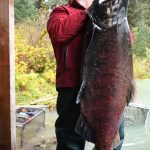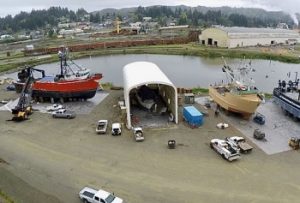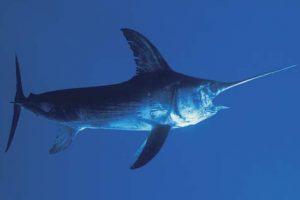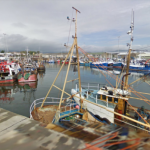Tag Archives: Maine Lobstering Union
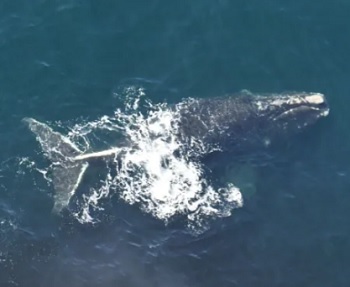
Research Team Supports Reinstatement of Maine Lobster Fishing Ban
The New England Aquarium’s Right Whale Research Team recently voiced their support of a recent ruling by a federal appeals court which reinstated protective measures for critically endangered North Atlantic Right Whales off the coast of Maine. Despite objections from the Maine Lobstering Union, the ban of lobster fishing in hundreds of miles of waters off the coast of Maine was upheld by the First U.S. Circuit Court of Appeals. In their statement, the Right Whale Research Team said,,, >click to read< 11:17

Fed appeals court reinstates lobster gear restrictions off Maine’s coast
A federal appeals court is reinstating restrictions on fishing gear in a nearly 1,000-square-mile swathe of ocean off Maine’s coast. In October, in an effort to protect the roughly 340 right whales remaining on the planet from potentially deadly entanglements with fishing gear, the federal government imposed a four-month restriction on the use of trap-rope in the area. Before the restrictions took effect, the Maine Lobstering Union won a stay from a U.S. district judge in Bangor. But Late Tuesday, a federal appeals court in Boston ruled that the lower court overstepped its authority. >click to read< 10:16

Judge rejects efforts by feds, enviro’s to impose immediate restrictions on lobstering
Last month, Justice Lance Walker sided with the Maine Lobstering Union and granted a temporary injunction to stop a new federal closure of a roughly 960-square mile area off the Maine coast. The federal agencies appealed that decision and asked for an emergency “stay” of the order, contending the closure is essential now to protect endangered right whales. On Friday, Justice Walker denied that request, meaning the area remains open to fishing. >click to read< 16:10

Feds, con groups file appeal to reinstate seasonal lobstering ban
In their appeal, the federal government and the conservation groups, the Center for Biological Diversity, the Conservation Law Foundation and the Defenders of Wildlife, argue that not only did the National Marine Fisheries Service use the best available science, but also that the lobstering groups did not present any actual evidence of the “certain economic harms” the judge referenced. Also in the appeal, the groups claim that the plaintiffs’ criticism of the availability and quality of data to support the restrictions is misplaced. The fisheries service admitted that more data would be beneficial to refine the agency’s understanding of right whale distribution, but it argued that the data already available is sufficient. >click to read< 08:02
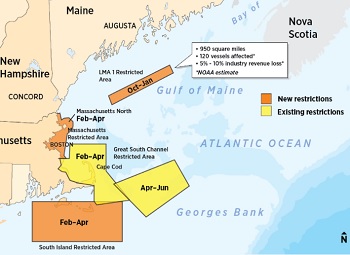
Gulf of Maine: Whale scientists fire back – Marine biologists disagree with a judge’s decision
Lobster industry professionals, elected officials and now a federal judge have expressed doubts as to whether the National Marine Fisheries Service used the best available science in imposing the closure, and whether the whales even frequent the area. They all argue that the statistical modeling used by federal regulators leaves much to be desired. Sean Todd, a marine biologist and director of Allied Whale, a marine mammal research group located at the College of the Atlantic in Bar Harbor, disagrees with both the decision to block the closure and the claim that there are insufficient data to justify it. >click to read< 09:27

Maine lobster rules should be based on real-world data – the government needs more than guesswork
The people involved in the Maine lobster fishery got a reprieve from new federal whale protection rules last week. U.S. District Court Judge Lance Walker ruled Saturday that the Maine Lobstering Union had successfully shown that a temporary ban on fishing would cause some of their members “irreparable harm.” Walker found that the government scientists failed to show that the rules would protect any whales, or even that there would be any North Atlantic right whales in protected areas to benefit from a closure. >click to read< 10:55

Sanity! Federal judge blocks lobster fishing ban in the of Gulf of Maine
A federal judge in Maine on Saturday blocked a seasonal ban on traditional lobster fishing in a stretch of offshore waters in the Gulf of Maine that regulators say is needed to save the endangered right whale from extinction. In his 28-page ruling, U.S. District Judge Lance Walker said regulators had relied on “markedly thin” statistical modeling instead of hard evidence to show the thousand-square-mile area they had planned to close was really a hot spot for the imperiled whale. While the area targeted for closure may be a viable habitat for the right whale, there is no hard proof the whales actually gather there,,, >click to read< “This victory by the Maine Lobstering Union is a significant step in protecting one of Maine’s most precious industries – lobstering,” 21:10
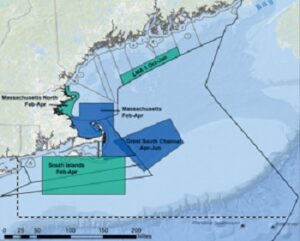
Maine Lobstering Union, lobster dealers sue over offshore closure
The union and its co-plaintiffs allege that the closure is “the product of an arbitrary and capricious agency action” and argued that the federal government’s own data showed there has not been an entanglement in Maine lobster gear for nearly 20 years. Instead, the National Marine Fisheries Service made the closure “simply to spread risk reduction responsibility across jurisdictions, without regard to the fact that lobster fishing is far more important to Maine’s economy than it is to that of any other state.” >click to read< 13:26
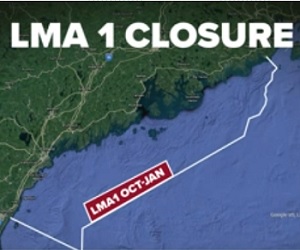
Last ditch effort? MLU gets legislative backing for court fight over Right Whale closure
In some of Maine’s biggest lobster harbors such as Stonington and Deer Isle, the closure of nearly 1,000 square miles of fishing territory is a big worry. In some of Maine’s biggest lobster harbors such as Stonington and Deer Isle, the closure of nearly 1,000 square miles of fishing territory is a big worry. Virginia Olsen fishes there and is also a leader of the Maine Lobstering Union.,, The lobstering union is going to federal court next Friday, hoping to get a temporary restraining order to stop the closure.,,, In advance of that hearing, the Maine Legislature is getting involved. >Video, click to read< 13:35
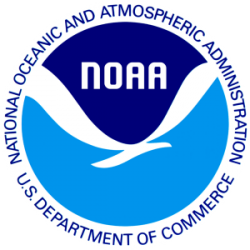
Maine Legislature threatens legal action while Maine Lobstering Union moves ahead – Files Federal Lawsuit
The Maine Legislature is threatening to fight the federal government in court over a set of controversial new seasonal restrictions on lobster harvesting in the Gulf of Maine. Last month, the National Oceanic and Atmospheric Administration released a new set of rules for New England’s lobster fishery aimed at reducing the risk to critically endangered North Atlantic right whales and other whale species. >click to read< The Maine Lobstering Union (MLU) has filed a civil action in the United States District Court for the District of Maine, seeking emergency relief related to the impending closure by agencies of the federal government of productive lobster grounds utilized by Maine’s lobster fishermen and women. >click to read< 11:04

Lobster fishing cooperative wins more than $1 million in dispute with former CEO
A federal arbitrator has awarded a fishing cooperative more than $1 million in the cooperative’s lawsuit against its former CEO, whom the co-op accuses of defrauding and stealing from the group. The arbitrator’s award allows the cooperative’s federal lawsuit to go forward against the former CEO and his parents, who own a Hancock County lobster pound. Lobster 207 LLC sued Warren Pettegrow and his parents, who own and operate the Trenton Bridge Lobster Pound, in December 2019 in U.S. District Court in Bangor. The lawsuit alleged that the family members defrauded and stole from the group after they sold their wholesale lobster business to it in 2017. >click to read< 11:54

Arbitrator upholds firing of Lobster 207 co-op CEO, clearing way for racketeering lawsuit
The former CEO of Lobster 207, a fishing cooperative owned by the Maine Lobstering Union, on Monday lost in an arbitration proceeding over his firing in 2020. The decision against Warren B. Pettegrow of Trenton upholds his dismissal and is expected to allow a federal racketeering lawsuit, pending before the U.S. District Court in Bangor, to continue toward trial, according to a news release from the co-op. Named as defendants in the suit brought by Lobster 207 are Pettegrow, his company, Poseidon Charters Inc., Anthony D. and Josette G. Pettegrow of Trenton, and their company Trenton Bridge Lobster Pound Inc. >click to read< 18:56

Maine Fishermen slow offshore wind farm development – Keep Fighting
Actions by Maine fishermen directly affected the process of offshore wind development in the Gulf of Maine with a bill signed into law on July 7 by Governor Janet Mills. The measure was a response to plans that surfaced last year for a 16-square-mile, 12-turbine wind farm, called a “research array,” off the southern coast of Maine. Proponents promised good jobs and cheap, green electricity. Fishermen weren’t so sure. They envisioned wind farms springing up throughout the Gulf of Maine, harming marine life and damaging coastal communities. “We as fishermen work and take care of the water,” said Virginia Olsen, a Maine Lobstering Union director who lives in Stonington. “We feel these things will get dumped on the water and then someone will say, ‘Just leave them there, it’ll be a coral reef.’ But it will just be trash left for us.” >click to read< 16:55
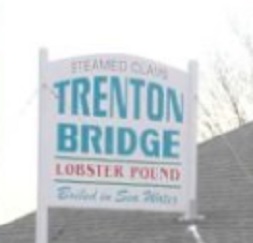
Trenton Bridge Lobster Pound owners file countersuit
The Pettegrow family, owners of the Trenton Bridge Lobster Pound, has filed a counterclaim against Lobster 207, which purchased the lobster pound’s wholesale operation and has accused the family of embezzlement, theft and breach of contract. In the new claim filed in federal district court earlier this month, the Pettegrows, who continue to run the Trenton Bridge restaurant, contend that Lobster 207 broke its agreements with the family, engaged in smear campaigns to get out of contractual obligations and made the Pettegrows scapegoats for Lobster 207’s own failings. >click to read< 10:42

“Protect the Gulf of Maine”: Fishermen to Rally in Augusta April 28th
Leaders in the lobster fishing industry are planning a “Protect the Gulf of Maine” rally in Augusta next week to highlight issues related to the development of offshore wind power. The rally is scheduled for Wednesday, April 28, at the Augusta Civic Center, with guest speakers slated to talk at 10 a.m. They include Olsen; U.S. Rep. Jared Golden, Maine State Senate President Troy Jackson; State Rep. Billy Bob Faulkingham, and others. Local 207 is part of the Protect the Gulf of Maine coalition. The group calls offshore wind development “a threat to the Gulf of Maine ecosystem and our way of life in Maine.” >click to read< 15:35

The Maine Fishing community weighs in on offshore wind development
Maine’s fishing community is deeply concerned that wind development will end our fishing heritage, which has sustained coastal communities for centuries and is integral part of Maine’s identity. Without dedicated research proving otherwise, we are skeptical that offshore wind can deliver on its promise of affordable clean energy as promised by global energy companies. “The state of Maine should be wary of trading its fishing heritage by entering a race to fulfill empty promises from international energy companies,” warned Executive Director Patrice McCarron of the Maine Lobstermen’s Association. Wise words from the Executive Director. >click to read< 11:30

Federal judge gives NOAA time to craft new whale rules
A federal district court judge, in a decision issued late on Wednesday, Aug. 19, gave the National Oceanic and Atmospheric Administration’s National Marine Fisheries Service (NMFS) nine more months to craft new rules to protect endangered right whales from entanglement in lobster fishing gear. Judge James E. Boasberg also denied a request by conservation organizations for an immediate ban on lobster fishing in a vast area of the ocean south of Nantucket Island in Massachusetts. >click to read< 09:45

New England: Judge Says He’ll Decide Within 2 Weeks When Feds Issue New Right Whale Protection Rules
The federal government and the lobster industry say any change should wait until May 2021 to allow for full review and public comment on new rules once they are proposed. In oral arguments before U.S. District Court Judge James Boasberg Monday, their lawyers argued that the courts should not be in the business of micro-managing the fishery.,, The conservation groups are also calling for an immediate and year-round ban on fishing with rope in an area off Nantucket where the whales have been congregating in recent years. But a lawyer for the Maine Lobstering Union, Alfred Frawley, argued that would cause unwarranted economic harm, because the whales are known to be present mostly for a limited period in the spring. >click to read< 08:14

Judge orders former owners to come up with $1.43M in lobster sales lawsuit
A federal judge has ordered the former owners of a wholesale lobster business and the Trenton Bridge Lobster Pound to set aside $1.43 million,,, The Maine Lobstering Union in December sued the former CEO of its wholesale business and his parents in U.S. District Court in Bangor, alleging that the family defrauded and stole from the group after selling it their wholesale lobster business three years ago. U.S. District Judge Lance Walker accepted an estimate of the amount of money lost as $1,438,181.23. That figure was provided by certified public accountants in Portland hired by the lobstermen’s co-operative, according to court documents. >click to read< 08:59

“Prince of Whales” threatens lawsuit against Maine Lobstering Union members
Richard Max Strahan has threatened to sue the Maine Lobstering Union (MLU), the Maine Lobstermen’s Association (MLA) and their individual members for damages under the federal Racketeer Influenced and Corrupt Organizations (RICO) Act. The statement was contained in papers Strahan filed Monday in the U.S. District Court in Bangor in a lawsuit he began last year under the self-styled name “Man Against Xtinction.” Naming the commissioner of the Department of Marine Resources and the assistant administrator of the National Marine Fisheries Service (NMFS) as defendants, the suit asked the court to rule that the decision by NMFS to allow the Maine lobster fishery violates the law governing federal administrative procedures and, consequently, the federal Endangered Species Act. >click to read< 11:40

Ex-Head of Maine Union Co-op Named in Racketeering Suit
The annual Maine lobster catch might not be in trouble, but certain people who sell it are. On December 5, Lobster 207, a wholesale marketing cooperative owned by the Maine Lobstering Union, an affiliate of the International Association of Machinists and Aerospace Workers, filed a civil racketeering complaint in Bangor federal court against its former head, Warren Pettegrow, his company Poseidon Charters Inc., and three other persons. The suit alleges the defendants engaged in a two-year scheme to loot the co-op. >click to read< 11:20
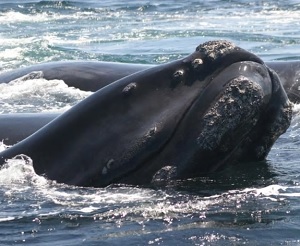
Maine lobstermen tell federal regulators: We’re not killing the whales
The Maine Lobstering Union accuses the agency of caving to environmental organizations when it should be defending the industry. Kristan Porter, a Cutler lobsterman who heads up the Maine Lobstermen’s Association, said the modeling tool the agency had come up with to determine risk had been sharply criticized by a team of independent scientists during a peer review conducted late last year. Stonington lobsterman Julie Eaton urged regulators to stop playing dangerous games with fishermen’s lives and livelihoods. We don’t want to see any animal go extinct, but blaming us for the right whale’s decline is like blaming Mexico for the plight of the polar bear, she said. >click to read< 09:47

The Maine Lobstering Union says the CEO of Lobster 207 and his parents embarked ‘on a systematic scheme’ to enrich themselves.
A federal lawsuit is alleging that the former owners of a Trenton lobster wholesaler violated an agreement to leave the business and instead stole $1.94 million from the new owners. The suit, filed in Bangor federal district court, said that the Maine Lobstering Union bought a wholesaling business in Trenton from Anthony and Josette Pettegrow in early 2017. >click to read< 09:14
Lobstermen’s union says former CEO and his parents embezzled funds, committed fraud – >click to read< 11:06
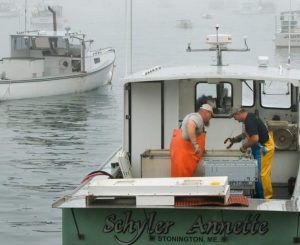
Second Maine lobstering group rejects state’s plan for protecting whales
The Maine Lobstermen’s Association staked out its position on the Maine Department of Marine Resources’ proposal with a board vote Thursday night. Director Patrice McCarron would not disclose the vote breakdown, calling that a private matter. The group did, however, release a statement about why it couldn’t support the plan. “It seeks reductions that exceed the documented risk posed by the Maine lobster fishery,” >click to read< 06:16
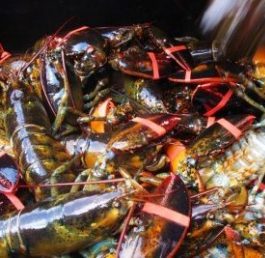
Lobster industry split over whale protection plan called Maine’s ‘line in the sand’
Some fishermen at the South Portland meeting cheered the plan. One gave Keliher a standing ovation, saying the new proposal was much better for the lobster fleet than the task force plan rolled out in August that called for 50 percent fewer buoy lines. But fishermen in Ellsworth and Waldoboro, the site of the first two meetings this week, urged Keliher to resist federal pressure to make concessions that would hurt lobster fishermen when they pose no real threat to the whale.,, “Grow a backbone,” one lobstermen told Keliher. “Don’t give them anything now.” >click to read< 07:47
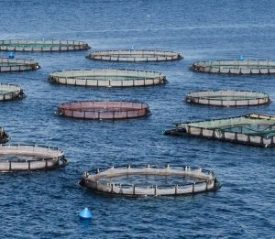
Aquaculture poses threat to the lobster industry
As president of the Maine Lobstering Union, I know we have struggled with several concerns this summer from right whales to bait shortages to aquaculture leases. We need to take steps now to fix rules and regulations around aquaculture. If we don’t, it will encroach on ocean space for everyone. The lease sizes have gotten so large we are making Maine’s oceans attractive to out-of-state corporations. By Rock Alley >click to read< 11:40
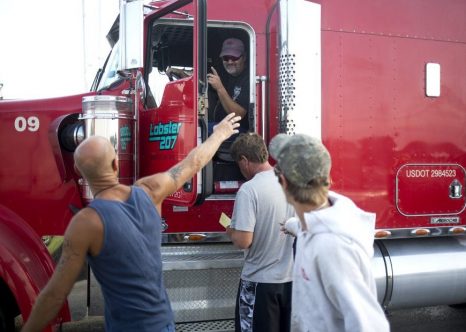
Maine lobstermen tap into union network for retail sales
A few months after buying a lobster pound and processing plant, Maine’s lobstering union is now tapping its connection to unions across the country to rack up online retail sales and reap greater financial returns for its members. The union is now shipping live Maine lobster caught by its 400 members anywhere in the country. The path these lobsters will take on their way from the ocean floor to your door is completely unionized, from the Vinalhaven lobsterman who traps it to the Rockland truck driver who picks it up from a transfer boat to the Lamoine plant worker who packs it to the UPS teamster who delivers it. Anyone can buy them, of course, but the Maine Lobstering Union is definitely looking to make the most of a nationwide union network. click here to read the story 14:31
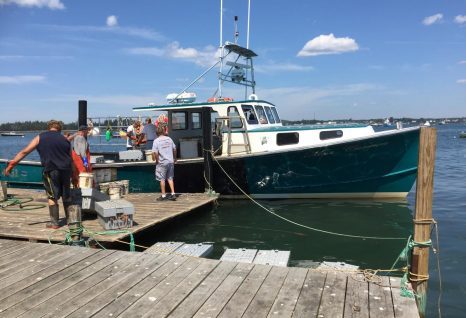
Maine Lobstering Union Pursuing Higher Profits
Maine lobstermen have long been known as a fiercely independent lot. But some are looking to the power of unity, in the form of a statewide, catch-to-table co-op. The goal is to harvest a larger and more predictable share of the profits. It’s 10 a.m. and Rock Alley has already been cruising Washington County’s Sequin’s Passage off Beals Island since a little after daybreak. The 60-year-old Jonesport fishermen tells his two stern men to get ready as he maneuvers his 46-foot, Jarvis Newman lobster boat through some shallow waters to get to his traps.,, Lobsters from the MLU are transported by union truck drivers to the Lamoine holding pound, where union employees sort, crate and eventually load them onto even larger trucks, also driven by union workers. click here to read the story 12:39
Bill to move Monhegan wind power project draws crowd to legislative hearing
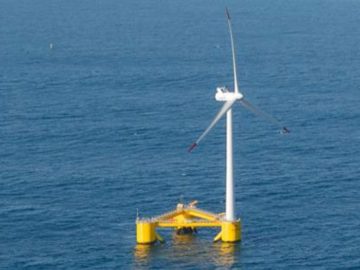 Lawmakers heard passionate, conflicting testimony Tuesday from dozens of people on a bill aimed at moving a nationally significant wind energy test site farther from Monhegan Island. Supporters said views of two massive floating turbines would jeopardize tourism, lobster fishing, migrating birds and the sense of serenity associated with Monhegan’s wild beauty. Some said island residents were being bullied and divided by the University of Maine and the partners of Maine Aqua Ventus, a project that is testing new technology for offshore wind turbines about 3 miles from the island. The project initially promised a small, brief test, but has now expanded it beyond anyone’s expectations. Opponents of the bill, which would move the test site at least 7 miles farther out to sea, said it is unneeded and unwelcome, adding that it would short-circuit the process by which islanders are evaluating the project’s potential benefits. Both sides said much is at stake. But representatives of the Maine Lobstering Union, which represents 500 fishermen, said wind power has no place on the Maine coast. Other lobstermen, though, spoke in favor of the turbines. Mary Weber, whose husband, Matt, fishes around the island, said they didn’t think the turbines would deter tourists, and might even draw a new set of visitors interested in clean energy. click here to read the story 15:30
Lawmakers heard passionate, conflicting testimony Tuesday from dozens of people on a bill aimed at moving a nationally significant wind energy test site farther from Monhegan Island. Supporters said views of two massive floating turbines would jeopardize tourism, lobster fishing, migrating birds and the sense of serenity associated with Monhegan’s wild beauty. Some said island residents were being bullied and divided by the University of Maine and the partners of Maine Aqua Ventus, a project that is testing new technology for offshore wind turbines about 3 miles from the island. The project initially promised a small, brief test, but has now expanded it beyond anyone’s expectations. Opponents of the bill, which would move the test site at least 7 miles farther out to sea, said it is unneeded and unwelcome, adding that it would short-circuit the process by which islanders are evaluating the project’s potential benefits. Both sides said much is at stake. But representatives of the Maine Lobstering Union, which represents 500 fishermen, said wind power has no place on the Maine coast. Other lobstermen, though, spoke in favor of the turbines. Mary Weber, whose husband, Matt, fishes around the island, said they didn’t think the turbines would deter tourists, and might even draw a new set of visitors interested in clean energy. click here to read the story 15:30
Maine lobstermen figured out how to make more money off their catches
 A lobstermen-only fishing organization has purchased a local lobster wholesale business, extending the reach of its members further down the distribution chain and giving them a greater share of the profit off their catch. The Maine Lobstering Union, formed in 2013 in the wake of a sharp drop in prices paid to lobstermen by dealers, is buying Seal Point Lobster Co., a wholesale lobster distribution firm owned by the Pettegrow family. The Pettegrows also own the Trenton Bridge Lobster Pound restaurant, which is not part of the sale.,, “It’s about putting lobstermen in a better position in the value stream on the shore side of the industry that they’ve never had access to,” Pitcher said recently. Read the story here 08:35
A lobstermen-only fishing organization has purchased a local lobster wholesale business, extending the reach of its members further down the distribution chain and giving them a greater share of the profit off their catch. The Maine Lobstering Union, formed in 2013 in the wake of a sharp drop in prices paid to lobstermen by dealers, is buying Seal Point Lobster Co., a wholesale lobster distribution firm owned by the Pettegrow family. The Pettegrows also own the Trenton Bridge Lobster Pound restaurant, which is not part of the sale.,, “It’s about putting lobstermen in a better position in the value stream on the shore side of the industry that they’ve never had access to,” Pitcher said recently. Read the story here 08:35

































